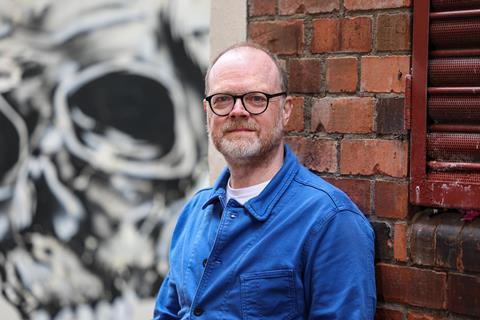
Belfast-based Trevor Birney may have honed his craft making documentaries, but following the raucous hit biopic Kneecap the producer is now fully embracing the scripted form with a varied slate of projects, including the next feature from Kneecap director Rich Peppiatt.
Birney has optioned the rights with Peppiatt to academic book Bad Bridget by Leanne McCormick and Elaine Farrell, for which Peppiatt has written a script, with hopes to shoot in the next 12 months. The book focuses on the huge number of Irish women in the 1800s and 1900s who were incarcerated in US and Canadian prisons.
“They had all come off the famine ships, the coffin ships, and didn’t have the experience Saoirse Ronan had in Brooklyn, where she fell into the wonderful, comfy surroundings of Brooklyn,” explains Birney. “A lot of them, ended up in destitution, prostitution and crime, basically trying to stay alive, having fled this famine that had been imposed on the island of Ireland.
“The book chronicles their stories, and the title comes out of a lot of the work young Irish women found themselves in New York at the time in the kitchens of wealthy people, and many of the young women who came off the ships had what were [deemed] unpronounceable Irish names. They were all given the name Bridget. There were some ‘bad’ Bridgets, and they ended up in prison.”
The Bad Bridget adaptation is being produced through Coup d’Etat Films, the company Birney set up with Peppiatt, which will house all their future joint projects.
Birney is also still very much alive and kicking with Fine Point Films, the company he founded in late 2012. The 10-strong team has between three and five projects in production at any one time, with Bafta winner Kneecap (which took £2.2m at the UK-Ireland box office in the summer of 2024 for Curzon and Wildcard) its first narrative fiction feature.
Lisa Barros D’Sa and Glenn Leyburn’s Saipan, starring Steve Coogan, is completed and set for release in UK-Ireland through Vertigo and Wildcard on September 19, while Fine Point has also now wrapped a Sligo shoot on You’ll Never Believe Who’s Dead. Birney describes the latter film as “a dark, cynical, Christmas heist film” written and directed by Dallan Shovlin, who was a second assistant director on Kneecap, and produced through Fine Point and Wildcard, with funding from UK Global Screen Fund, Screen Ireland and Northern Ireland Screen.
“I hope there is going to be an enduring legacy from Kneecap for indigenous filmmaking, in both English and Irish language,” says Birney. “It’s another generation that has come as a result of the success of Kneecap.”

The former journalist is also still making documentaries, with two playing at the Galway Film Fleadh this week – the world premiere of The Negotiator which examines the life and work of the man credited for bringing the Good Friday Agreement into being, US senator George Mitchell. Birney directs, with Stephen Douds and Andrew Tully producing.
Alison Ellwood’s Boy George & Culture Club is also screening in Galway following its world premiere at Tribeca. Birney has produced alongside Andrew Tully, Ben Silverman, Howard Owens, Natalia Nataskin, Lawrence Mestel and David Blackman.
Distribution discussions are ongoing with Fine Point representing The Negotiator directly, and Silverman and Owens’ Los Angeles-based Propagate leading on Boy George & Culture Club.
“It feels like we’ve only been making documentaries about men called George,” laughs Birney, who first met George Mitchell in 1995. ”I had admiration for him for coming to Belfast, which was little more than a war zone at that stage.”
“There’s a very contemporary message [in there] about what it takes to make peace,” he continues. “God knows, when we look to Gaza and to the Palestinian people, and what’s happening in the Middle East generally, there needs [to be] a George Mitchell.”
The Boy George documentary came about after the singer was interviewed for Let The Canary Sing, the Cyndi Lauper 2023 documentary on which Fine Point worked on with Ellwood.
A major challenge was getting the band’s drummer Jon Moss on board, after a bitter legal dispute between the band and Moss over lost income, and the fallout of Moss and Boy George’s doomed romance.
“It took us some time to encourage Jon to tell his story, given all the ups and downs and legal disputes. I had to spend a lot of time talking to Jon and encouraging us to trust him. Ultimately, as filmmakers, that’s what we have to do, we’re asking people to trust us with their story,” says Birney. ”This is really a love story, it’s a love story wrapped in a music doc, and that was the axis on which this band spun.”
On the TV side, Birney is working on a two-part documentary for RTE about Irish sportsman DJ Carey, who Birney describes as having been “the David Beckham of hurling”. He then fell from grace after being found guilty of defrauding people while falsely claiming he had cancer.
Cross-border collaboration
Birney is also at Galway speaking on a panel titled ’Shared Island: Cross Border Collaboration’, taking place on July 12, about the opportunities and challenges for deeper collaboration between creatives, producers, funders and institutions across the island of Ireland.
“We’ve done three cross-border films in three years. We can and we have to work better to find ways we can bring all the talent from across the island together and make it much easier for those cross-border projects to get up on their feet,” says Birney.
The challenges, Birney says, are many. “It’s the [different] currency. It’s the two different tax credits, UK tax credit, Section 481 [in Ireland], you’ve got different contracts that the crews are on and different on both sides of the border. And you’ve got Northern Ireland Screen, which is an economic fund, and you’ve got Screen Ireland, which is a cultural fund.”
Birney is also concerned about a lack of producers working in the narrative space based in Northern Ireland.
“Of all the approaches I’ve had in the last 12 months, the majority of them have probably come from the south of Ireland. We went to Cannes this year, the vast majority of people from Ireland were from the south of Ireland. There’s got to be some kind of levelling up that helps both sides of the border,” he stresses. “I look around Belfast and go, where’s the drama company?”

























No comments yet